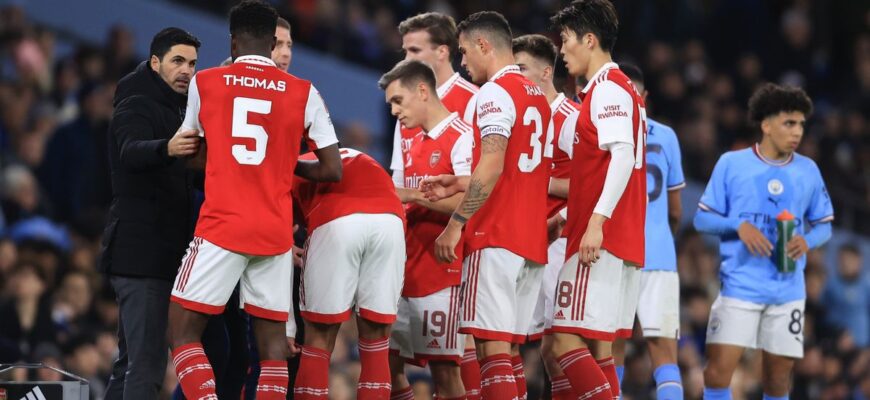In the gladiatorial arena of the Premier League, where every misstep is magnified under the digital microscope, managers like Mikel Arteta find themselves not just managing a team, but meticulously managing narratives. Following Arsenal`s recent 1-0 defeat to Liverpool, a familiar chorus of criticism emerged, questioning the Gunners` tactical approach. Arteta, however, has swiftly moved to rebut these claims, painting a picture of a team far from conservative, merely navigating the choppy waters of top-flight football with pragmatism and a clear vision. The debate highlights a perennial challenge for modern football — distinguishing perception from reality.
The `Conservative` Conundrum: A Question of Intent
The murmurs began after the Anfield clash: Arsenal, it was argued, played with an overly cautious hand, deploying what some pundits dubbed “three defensive midfielders.” This assessment, often delivered with the confident air of a seasoned tactician observing from a comfortable studio, struck a chord with Arteta. His riposte was sharp, almost surgical, focusing on the example of Mikel Merino, who, after scoring a hat-trick for Spain in World Cup qualifiers, was paradoxically labeled `defensive` by some. “I don`t know when was the last attacking midfielder to score three goals,” Arteta quipped, hinting at the irony of a narrative that often overlooks nuance in favor of a convenient storyline.
It`s a testament to the instantaneous nature of modern football analysis that a single result can recalibrate perceptions so dramatically. Was Arsenal truly conservative, or were they strategically managing a challenging away fixture against a formidable opponent? The fine line between cautious respect and perceived timidity is frequently blurred, particularly when the scoreboard fails to favor the visitors.
The Invisible Battlefield: Injuries and Tactical Compromise
What the immediate post-match critique often conveniently omits is the unseen toll of injuries. Arsenal`s squad on that day was notably depleted, missing key attacking catalysts such as Bukayo Saka, Kai Havertz, and Ben White. Martin Odegaard, the creative heartbeat of the team, was also battling for fitness. To expect the same fluid, high-scoring offensive output from a side shorn of its primary architects is, at best, optimistic, and at worst, a wilful oversight.
A football team, much like a complex engine, requires all its finely tuned parts to function optimally. When cylinders misfire, or are entirely absent, adjustments are not merely optional; they are imperative. Arteta`s decisions, viewed through this lens, transform from “conservative” to “pragmatic.” Sacrificing a degree of attacking flair for structural solidity against a potent Liverpool side, given the circumstances, appears less like a lack of ambition and more like intelligent game management. After all, even world-class managers can`t conjure goals from thin air when their primary creators are watching from the sidelines.
The Manager`s Burden: Perception vs. Reality in the Digital Age
Arteta`s experience echoes that of many managers in the relentless Premier League spotlight. He recalled being “hammered” for the signing of David Raya, only for the goalkeeper to later demonstrate his quality. This pattern of swift condemnation followed by grudging acceptance (or renewed criticism after the next stumble) is the relentless rhythm of top-flight management. Public opinion, as Arteta astutely observed, is inherently malleable, shifting dramatically with the outcome of a match.
“You have to respect every opinion. At the end, the opinion is going to be different if you win or lose. You have to accept that.”
This statement encapsulates the often-unspoken truth: football analysis, particularly from a distance, is frequently influenced more by the result than by a deep dive into tactical nuances, player performances, or contextual factors. For a manager, navigating this landscape requires a thick skin and an unwavering conviction in one`s own process, irrespective of the prevailing digital winds.
Beyond the Narrative: A Team Driven by “Wanting More”
Despite the recent setback and the subsequent scrutiny, Arteta’s message to his squad remains consistent: a desire for more. He spoke of the collective feeling within the team post-Liverpool, an eagerness to “want more of those games” and to “review what we`ve done” for further improvement. This isn`t the sentiment of a team content with merely avoiding defeat, but rather one hungry for mastery and success.
Indeed, a look at Arsenal`s attacking pedigree when operating at full strength reveals a team capable of prolific goal-scoring, having scored a club-record 91 goals in a past Premier League season. Their ability to deliver two expected goals per game, even with a significant contribution from set pieces, underscores their offensive threat. The dip in attacking output last season, as highlighted by Arteta, directly correlated with the extensive injury list affecting key creative and scoring personnel.
As Arsenal prepare to face Nottingham Forest, the upcoming fixture serves as more than just another league game. It becomes a proving ground, an opportunity for Arteta`s men to provide a tangible answer to their critics. If the manager’s defiance and the team`s collective hunger are anything to go by, the Emirates Stadium could well witness a performance designed to emphatically shift the narrative from conservative caution to compelling conviction.








